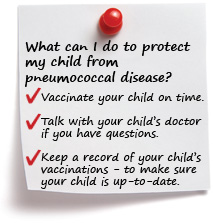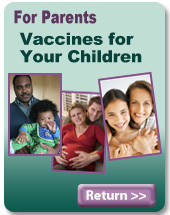Pneumococcal Disease - Fact Sheet for Parents
Diseases and the Vaccines that Prevent Them
Español: Enfermedad neumocócica
Printer friendly version[408 KB, 2 pages]
Benefits of pneumococcal vaccine (PCV13)
- Saves lives.
- Protects young children from serious disease and lifelong disability.
Side effects of the pneumococcal vaccine (PCV13)
The most common side effects are usually mild and include the following:
- Fussiness
- Sleepiness
- Loss of appetite (not wanting to eat)
- Soreness, redness, and swelling from the shot
- Fever
What is pneumococcal disease?
Pneumococcal disease is an illness caused by bacteria called the pneumococcus bacteria. It is often mild but can cause serious symptoms, lifelong disability, or death. Children under 2 years of age are among those most at risk for disease. The pneumococcal vaccine protects against this disease.
What are the symptoms of pneumococcal disease?
There are many types of pneumococcal disease. Symptoms depend on the part of the body that is infected.
Pneumococcal pneumonia (lung infection) is the most common serious form. It causes the following:
- Fever and chills
- Cough
- Rapid breathing or difficulty breathing
- Chest pain
Pneumococcal meningitis is an infection of the covering of the brain and spinal cord. It causes the following:
- Stiff neck
- Fever and headache
- Pain when looking into bright lights
In babies, meningitis may cause poor eating and drinking, low alertness, and vomiting.
Blood infection (bacteremia and sepsis) causes fever, chills, and low alertness. Pneumococcal disease causes up to half of middle ear infections (otitis media). Symptoms are ear pain; a red, swollen ear drum; and sometimes, fever and sleepiness.
How serious is pneumococcal disease?
Pneumococcal disease ranges from mild to very dangerous. About 4,000 cases of serious disease (meningitis and sepsis) occur each year in children under 5 in the U.S. These illnesses can lead to disability like deafness, brain damage, or loss of arms or legs. About 1 out of 10 children who get pneumococcal meningitis dies.
How does pneumococcal disease spread?
Pneumococcal disease spreads when an infected person sneezes or coughs.
Children can carry the bacteria in their nose and throat, and spread the bacteria, without being sick. Sometimes the bacteria spread from the nose and throat into the blood or lungs, causing severe disease. Other times it can spread to ears or sinuses, causing mild infections.
What is the pneumococcal vaccine or PCV13?
The pneumococcal vaccine is a shot that helps prevent pneumococcal disease. There are more than 90 types of pneumococcal bacteria. The vaccine called PCV13 protects against the 13 types that cause most of the severe illness in children. The vaccine can also help prevent some ear infections.
PCV13 protects children by preparing their bodies to fight the bacteria. Almost all children (about 9 children out of 10) who get PCV13 will be protected from the 13 types of pneumococcal bacteria in the vaccine.
When should my child get PCV13?
All babies should get PCV13. They need four doses at the following ages for best protection:
- One dose each at 2 months, 4 months, and 6 months; and
- A fourth dose at 12 through 15 months of age.
If your child misses a dose or starts late, he should still get the vaccine. Talk to your child’s doctor.
It is safe to get PCV13 at the same time as other vaccines. However, young children (12 through 23 months of age) who get inactivated flu vaccine and PCV13 at the same time appear to be at increased risk for seizures caused by fever. Studies done in 2010-11 showed that in this group, about one additional febrile seizure occurred among every 2,000 to 3,000 children vaccinated when the vaccines were given together than when they were given at separate visits. These seizures, called febrile seizures, are scary for parents, but they are not harmful to children. Ask your doctor for more information.
Why should my child get the PCV13?
Getting your child PCV13 protects him against serious, and even deadly, illness. There are medicines to treat pneumococcal bacteria, but these do not always prevent damage from the infection and, some bacteria have become resistant to those medicines. That means the medicines can’t kill the bacteria. Preventing pneumococcal infection is the best option.
 If my child does not get PCV13, will he get pneumococcal disease?
If my child does not get PCV13, will he get pneumococcal disease?
Without the pneumococcal vaccine, your child is at risk for this serious disease.
Each year in the U.S., pneumococcal disease causes thousands of cases of pneumonia and ear infections. Babies younger than 2 years of age are most likely to have a serious case of pneumococcal disease.
Before the vaccine, there were about 700 cases of meningitis, 13,000 blood infections, and 200 deaths from pneumococcal disease each year among children younger than 5 years. After the vaccine was introduced, these numbers dropped quickly.
Is PCV13 safe?
The pneumococcal vaccine is very safe, and it is effective at preventing pneumococcal disease. Vaccines, like any medicine, can have side effects. But severe side effects from PCV13 are very rare.
How can I learn more about PCV13?
To learn more about PCV13 or other vaccines, talk to your child’s doctor.
Call 800-CDC-INFO (800-232-4636) or go to the CDC Vaccines web site and check out the following resources:
- PCV13 (Pneumococcal Conjugate) Vaccine for Parents
- Infant Immunizations FAQs
- Vaccines website for parents
Fact Sheets for Parents
Diseases and the Vaccines that Prevent Them
![]() This symbol means you are leaving the CDC.gov Web site. For more information, please see CDC's Exit Notification and Disclaimer policy.
This symbol means you are leaving the CDC.gov Web site. For more information, please see CDC's Exit Notification and Disclaimer policy.
Copyrighted images: Images on this website which are copyrighted were used with permission of the copyright holder and are not in the public domain. CDC has licensed these images for use in the materials provided on this website, and the materials in the form presented on this website may be used without seeking further permission. Any other use of copyrighted images requires permission from the copyright holder.
Contact Us:
- Centers for Disease Control and Prevention
1600 Clifton Rd
Atlanta, GA 30333 - 800-CDC-INFO
(800-232-4636)
TTY: (888) 232-6348 - New Hours of Operation
8am-8pm ET/Monday-Friday
Closed Holidays - cdcinfo@cdc.gov




